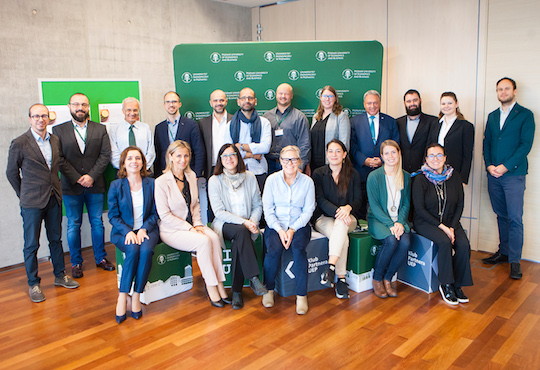Regional products, gastronomy, tourism, employment and local development – Links and shared value was the theme of FOODBIZ Final Conference Food@Work, hosted by Poznan University of Economics and Business, on 16 October 2019.
Attended by business players in food and gastronomy from Wielkopolska region, students from the University of Economics and Business of Poznan, as well as international academic guests and other concerned stakeholders, the conference highlighted the results achieved through the FOODBIZ project and the local stakeholder networks activated by the university partners in the consortium.
The event gathered representatives of all institutions involved in the project’s consortium including: lead partner, University of Macerata (Italy); the University of Gothenburg (Sweden); the University of Economics and Business of Poznan (Poland); the Faculty of Tourism and Hospitality Management of the University of Rijeka (Croatia); the European Cultural Tourism Network (ECTN), based in Brussels; the Piceno Lab of the Mediterranean Diet (Italy); the Svinesund Committee (Sweden); and IGCAT, represented by International Projects Manager, Fabrizia Toccoli.
Through her presentation Cross-sectoral dialogue for local sustainable development: success stories from IGCAT’s European Regions of Gastronomy, Fabrizia Toccoli promoted the European Region of Gastronomy programme, stressing how gastronomy, if approached holistically, can ensure cultural, social, economic and environmental benefits for the regions.
Moreover, she presented the FOODBIZ Guidelines, a how-to guide developed by IGCAT collecting the project’s methodology, tools and outputs to allow exploitation of the FOODBIZ model by further universities and communities in Europe.
Introduced and moderated by Magdalena Florek, from Poznan University of Economics and Business, who briefly presented FOODBIZ aims and results, the conference included further interventions from the project partners.
IGCAT Expert, Professor at the University of Macerata, and head of FOODBIZ coordinating team, Alessio Cavicchi focused on university-business cooperation to ensure local development through agri-food.
Nikolos Vogiazides and Manos Vougioukas, from the European Cultural Tourism Network (ECTN) highlighted the synergies between FOODBIZ methodology and UNWTO-BCC Guidelines for the Development of Gastronomy Tourism and presented the ECTN Awards.
The Influence of autochthonous regional products on regional brand was illustrated by Sandra Jankovic, from the University of Rijeka, who brought examples from Kvarner region, while Lena Mossberg and Chiara Rinaldi, from the University of Gothenburg, presented the case study Scary seafood and local development.
International guests included Cristina Santini, from San Raffaele University (Italy), who brought the example of Tuscany to explain the link between wine and local development; Massimo Giovanardi, from the University of Bologna (Italy), who highlighted the role of food and gastronomy in place branding; and Janis Sijats, from Vidzeme Tourism Association (Latvia), with a presentation on Digital interpretation of fishing intangible heritage and a ‘wild food festival’ for gastronomy tourism.
Local case studies were also highlighted as the Croissant Museum in Poznan presented by Szymon Walter and the region’s participation in the Culinary Heritage Network explained by Kinga Kołodziejczak, Marshal Office of Wielkopolska Region.
The event was closed by Jakub Gazda, from Poznan University of Economics and Business.
The conference was organised as the final act of FOODBIZ – University and business learning for new employability paths in food and gastronomy, a two-year project funded by the Erasmus+ programme, in the framework of the Strategic Partnerships for Higher Education action.
The aim of FOODBIZ was to increase the employability of higher education students in gastronomy and tourism from the four partner universities by engaging them in co-creation activities and events with local businesses operating in their regional food markets and other relevant stakeholders.
One of the main achievements of the project was the development of local learning communities comprised of students, entrepreneurs, academics and policy-makers who discussed local challenges and possible solutions in a collaborative environment.
Through co-creation events, FOODBIZ partners were able to identify learning needs and design learning resources useful to tackle the knowledge and skills gaps of both students and business players. All materials will soon be available on FOODBIZ online learning platform as downloadable Open Educational Resources for both individual learning and on-demand workshops.
FOODBIZ final conference was followed by the last project meeting, held in Poznan on 17 October 2019 and aimed at drawing conclusions of the project, as well as discussing its sustainability in the future by building on the pilot’s legacy.
About IGCAT
IGCAT aims to empower local communities by raising awareness of the importance to safeguard and promote distinct food, culture, arts and sustainable tourism assets. This is essential to balance against globalised food trends that are impacting on our planet, health and local economies.
IGCAT is a non-profit institute established in 2012, working with regional stakeholder consortiums in the fields of gastronomy, culture, arts and tourism. It counts on the expertise of a worldwide network of experts and works in partnership with specialised intergovernmental organisations.
IGCAT provides the Region of Gastronomy Award and is the official secretariat for the European Region of Gastronomy Platform. Furthermore, the Institute has developed the European Young Chef Award the Local Food Gift Challenge, the Top Visitor Experience and the Food Film Menu.
About the European Region of Gastronomy
Candidate and awarded Regions of Gastronomy from Europe, guided by IGCAT, are working together to raise awareness about the importance of their cultural and food uniqueness; stimulate creativity and gastronomic innovation; educate for better nutrition; improve sustainable tourism standards; highlight distinctive food cultures; and strengthen community well-being.

